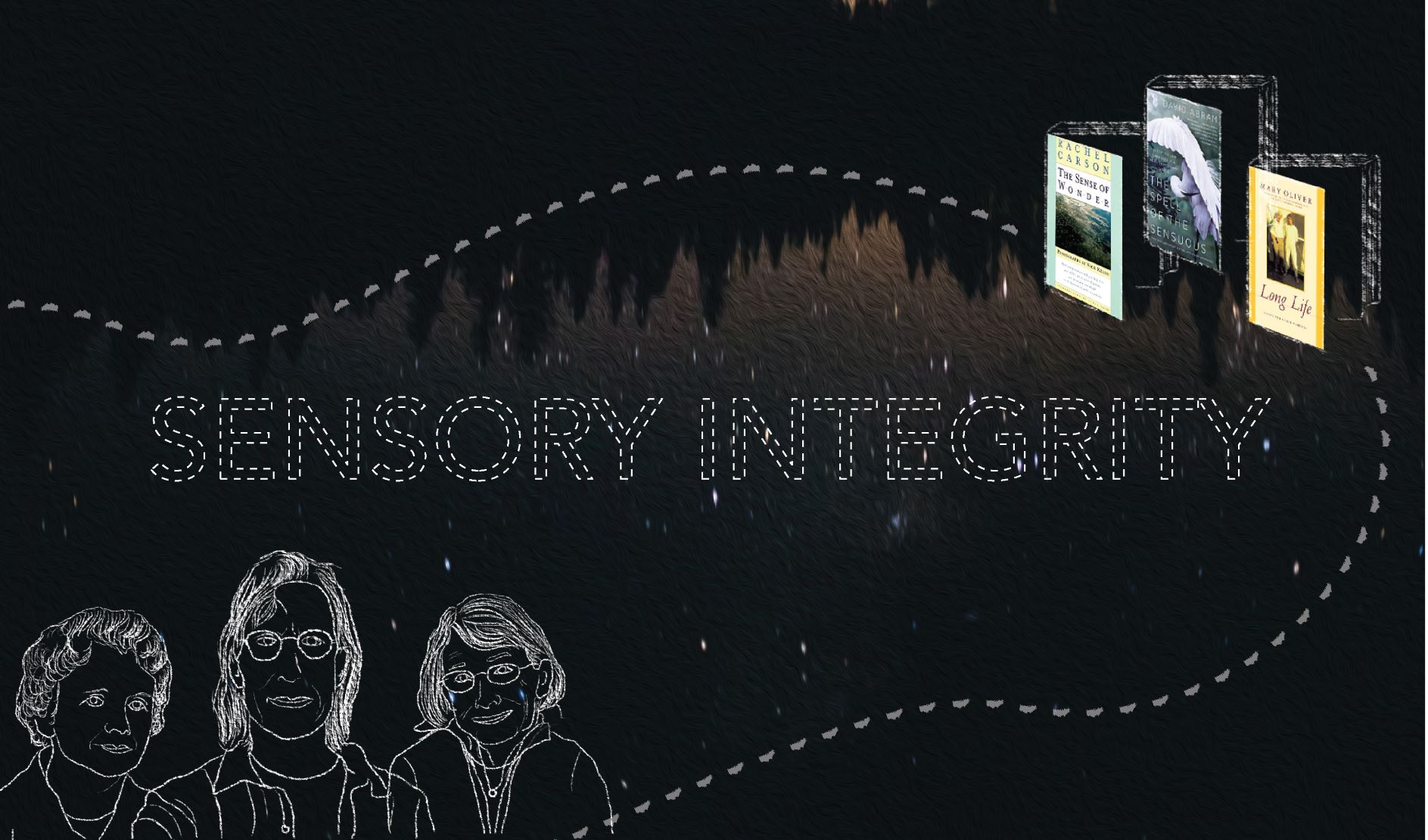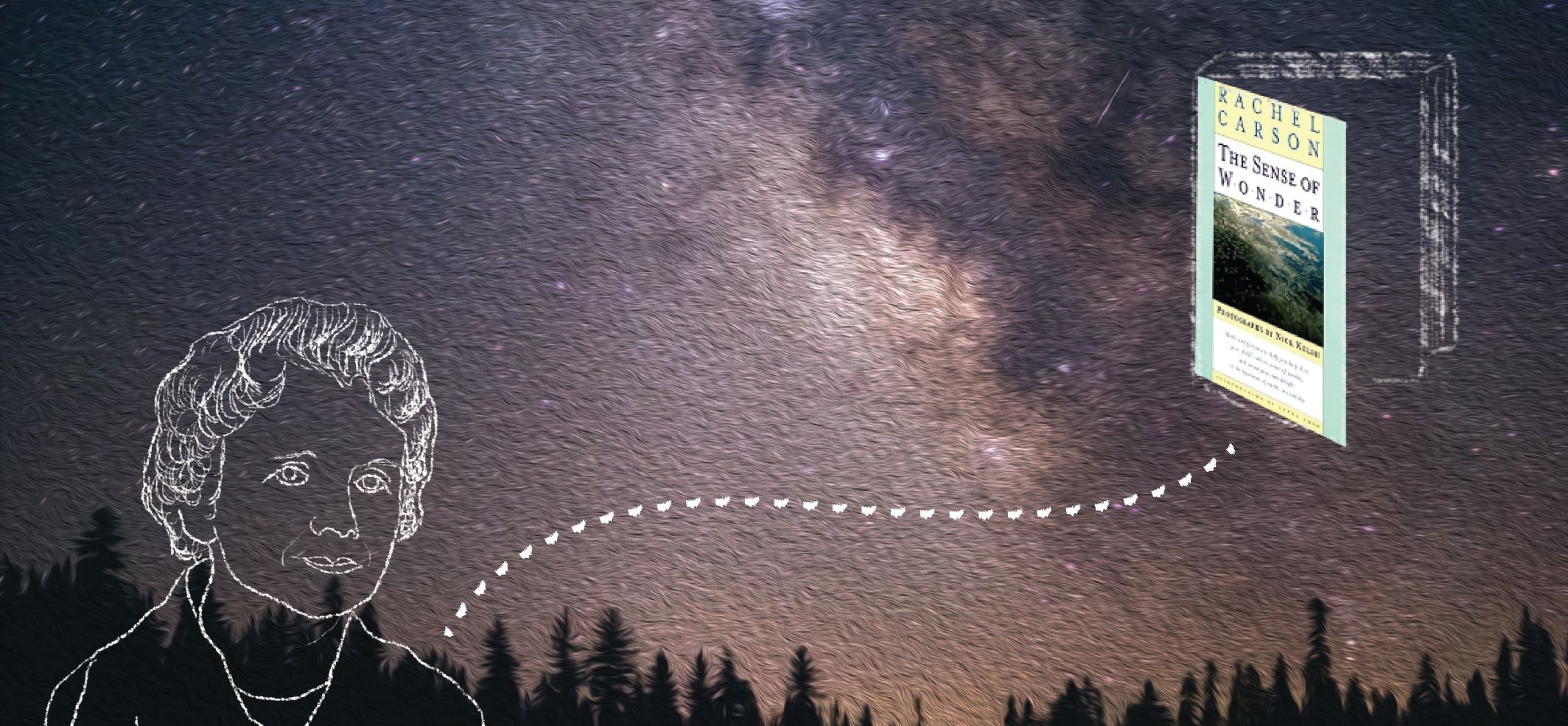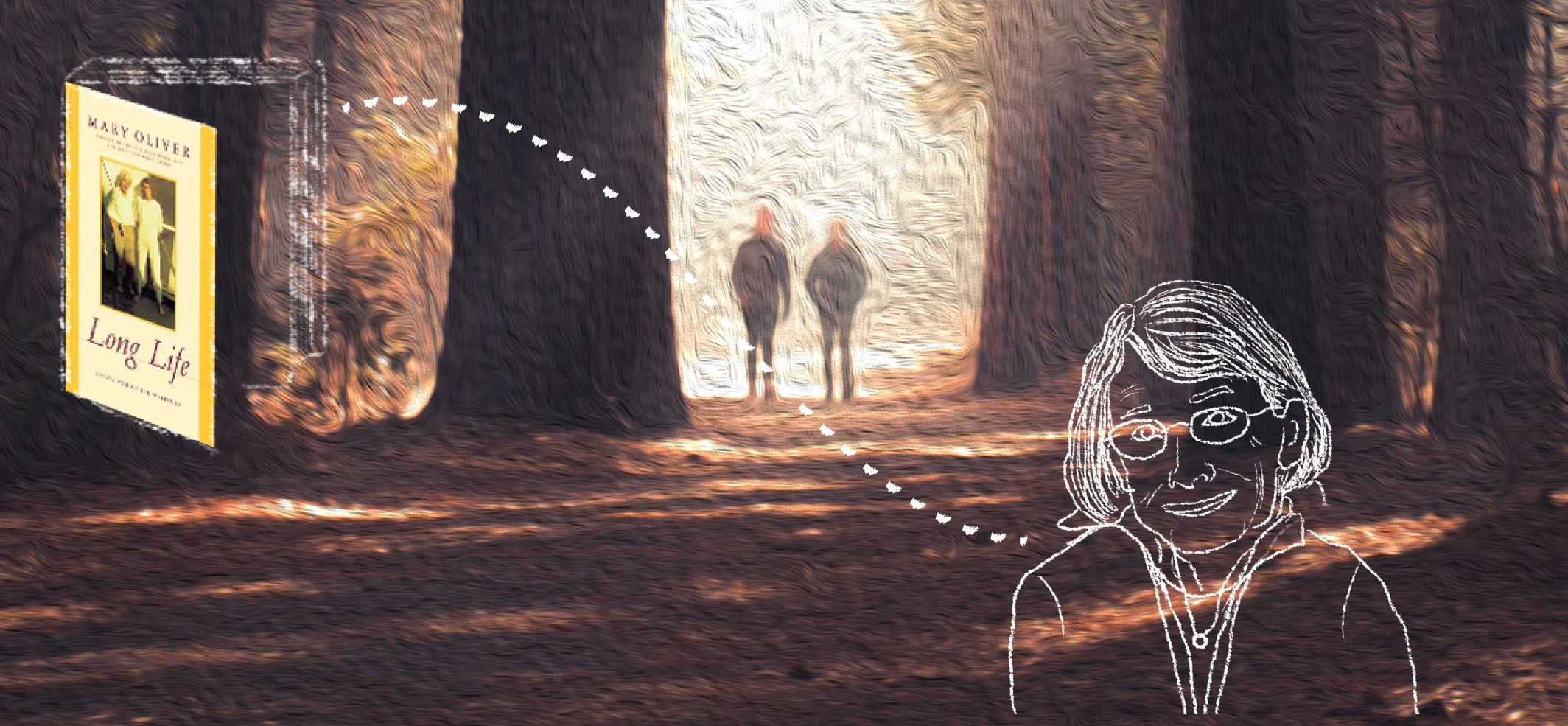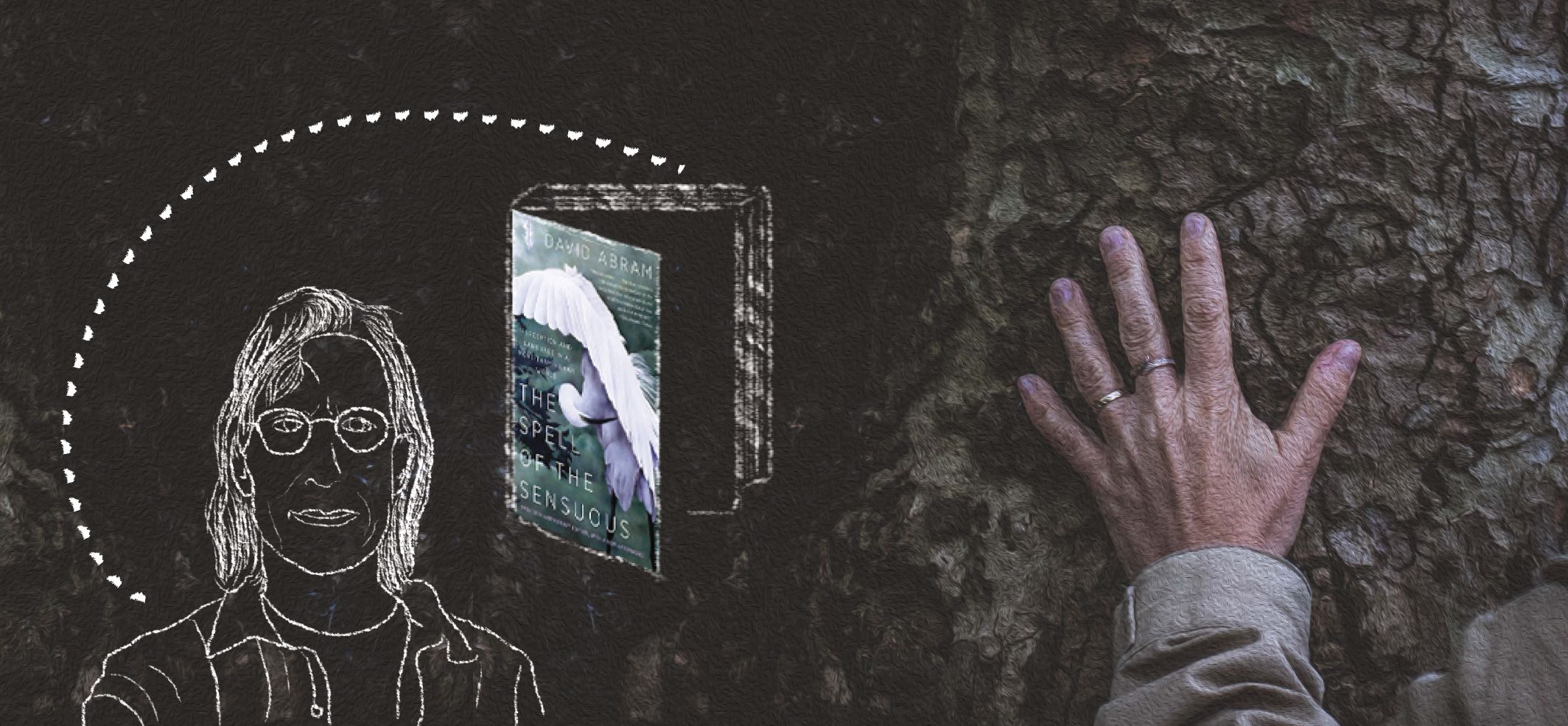
Illustration by Priyal Shah
Listen to this Story
Narrated by Anjan Prakash
SENSORY INTEGRITY – Offerings by Three Sensory Storytellers

Rachel Carson – The Sense of Wonder. Illustration by Priyal Shah
“One way to open your eyes to unnoticed beauty is to ask yourself, `What if I had never seen this before? What if I knew I would never see it again?’ – Rachel Carson, The Sense of Wonder
Rachel Carson, a scientist storyteller, specifically recalls a summer night sitting with her friend on a tiny island, laying and looking at the sky with millions of stars. ‘The night was so still,’ she describes, ‘my companion and I were alone with the stars; I have never seen them more beautiful: the Milky Way flowing across the sky, the patterns of the constellations standing out bright and clear, a blazing planet low on the horizon. Once or twice a meteor burned its way into the earth’s atmosphere. It occurred to me that if this were a sight that could be seen only once in a century or even once in a human generation, this little headland would be thronged with spectators. But it can be seen many scores of nights in any year, and so the lights burned in the cottages and the inhabitants probably gave not a thought to the beauty overhead; and because they could see it almost any night perhaps they will never see it.’
How intense and powerful her question and her observation. With this, Carson brings our attention to the several beauties that might go unnoticed because it is always around us and available, which is also why we might never end up seeing it. She is referring here to daily wonders of the earth in the above example, but we can expand this question to include people, objects within our home, and everything beautiful, we have missed or overlooked paying attention to, and ask: What if I had never seen this before? What if I knew I would never see it again?
How would this change the quality of our attention to what surrounds us within and without?

Mary Oliver – Long Life: Essays & Other Writings. Illustration by Priyal Shah
Mary Oliver, the poetic writer, expands this further.
“It is the intimate, never the general, that is teacherly. The idea of love is not love. The idea of ocean is neither salt nor sand; the face of the seal cannot rise from the idea to stare at you, to astound your heart. Time must grow thick and merry with incident, before thought can begin” – From: Long Life: Essays and Other Writings
She adds, `People say to me; wouldn’t you like to see Yosemite (yo- se-miti)? The Bay of Fundy? The Brooks Range? I smile and answer, `Oh yes, sometime’, and go off to my woods, my ponds, my sun-filled harbor, no more than a blue comma on the map of the world but, to me, the emblem of everything’
Here she brings our attention to belonging and beholding, that unfolds over a period of time, through a sense of cherishing something long enough in `privacy, intimacy and surety’ in the world. The thoughts on it, the ability to say anything of it, or to even write about it, is something that happens after such an intimacy is shared. A concept or idea of love, or an ocean, or the face of a seal, cannot teach anything. It is in the experience of them, a sensing of them with our whole being, that gives birth to a thought even. She shows that this kind of intimacy isn’t far flung, doesn’t have to wait. It can be with the trees that surround us, the nearest pond, the closest woods, the backyard sunset point, the plants in our balcony. It is in sensing the smell, textures, loving them through our eyes, and in wholeness, they have the capacity to teach us. If Rachel Carson asks us to pay attention to every day beauty, Mary Oliver invites us into an intimacy with it even if that place or being feels like a comma on the map of the world, for it might hold the depth of teaching of the whole world, for us.
This is an invitation to notice who or what surrounds us right outside our doors, with whom we need to feel love, or salt and sand, or be astounded in our heart, without us having to look too far, or travel beyond?
But as humans, can we today build such an intimacy with the more-than-human world, and the nature that surrounds us, we might wonder?

David Abram – The Spell Of The Sensuous. Illustration – Priyal Shah
Sleight of hand magician, sensuous storyteller and philosopher, David Abram reveals:
“Our bodies have formed themselves in delicate reciprocity with the manifold textures, sounds, and shapes of an animate earth – our eyes have evolved in subtle interaction with other eyes, as our ears are attuned by their very structure to the howling of wolves and the honking of geese. To shut ourselves off from these other voices, to continue our lifestyles to condemn these other sensibilities to the oblivion of extinction, is to rob our own senses of their integrity, and to rob our minds of their coherence. We are human only in contact, and conviviality, with what is not human’ – From: The Spell of the Sensuous
He reaffirms that as human beings we are tuned for relationship. He says, `All our senses – eyes, skin, tongue, ears and nostrils are gates through which our body receives the nourishment of otherness’.
Isn’t that just beautiful, to understand how each of our senses are meant for reception and reciprocity. Reception of what? – To receive the sounds, textures, and shapes of an animate earth. And to co-evolve in reciprocity to the other, to what is not just human, but also the rest of the natural world. He passionately describes, ‘to shut ourselves off from it, is to rob our senses of their integrity’. How joyful and true to realise that we are human only in our interaction and amiability with what is not human. And he reassures, `far from restricting my access to things and to the world, the body is my very means of entering into relation with all things’.
Rachel Carson holds an invitation to pay attention to the natural beauty we might be missing that surrounds us every day, Mary Oliver offers the possibility of intimacy to such expressions of nature, and David Abram reaffirms that to be a human being means to be in sensory integrity with our whole being, through a relationship with the rest of the natural world. In other words, we are very much a part of nature.
May we find a way to explore the sensorial beings we are, in relationship with the rest of the other world this weekend, and allow for the emotions and feelings that arise in such a realm. A paying attention of the daily sunrise, sunset, whatever little stars we can see or many, feel the breeze through the branches of the tree, experience the tree in all its seasons, notice people and beings in our immediate surroundings, behold and belong to them through a rich intimacy made possible with all our senses, and in doing so, explore the sensory integrity evolved and developed in relation to the rest of the world. To what makes us human, as David Abram reiterates.
I would love to hear what this essay brought up for you. What beauty do we miss from our daily life that has now caught our attention; and who or what in our surrounding did we engage with, with our whole bodily landscape, offering the rich intimacy possible through sensory integrity? Through our sharing, we shall also see more.
Thank you for reading, and may we flow into their sacred offerings.
May their words bring us a rich, intimate, and attention-filled weekend.
SOURCES:
Rachel Carson’s is from the book, The Sense of Wonder.
Mary Oliver’s is from the book, Long Life: Essays and Other Writings
David Abram’s is from the book: The Spell of the Sensuous

Ashvin Shivaraju
Hi Anjan, we all have taken for granted that the nature, the sky above will always be there and so it is ok to not see.
And we miss so many wonderful events, other planets.
Likewise, we even postpone visiting the loved ones. We really miss to receive their love in person.
Thanks Anjan, this topic is emotional too.
Best wishes
Ashvin
Anjan Prakash
Thank you Ashvin, for your careful reading, and for sharing what this meant for you. May we both see more of what the day is blessed with. And I really hope that you come to see us soon. Thanks for receiving my writing with your own introspection each time. 🌸
Kavita berry
Beautiful anjan— just indebted me more to the universe for gifting me the privilege of being so in touch with it—and also making me see how am still not as fully engaged as I could–nig thank you
Anjan Prakash
Dearest Kavita – thank you for reading and sharing. Yes, the many phases and grind of the every day work, doesn’t make it a reality for me to be as engaged either, but what I been practicing is to acknowledge and celebrate what little I am able to pay attention to within the reality of that day. And I have seen you, a large part of your work / day is so alive with this richness under your care and nurture! And with such books and words, we learn a little more each day. Thanks for being such a reader who has so much connection to the rest of the natural world too.💚